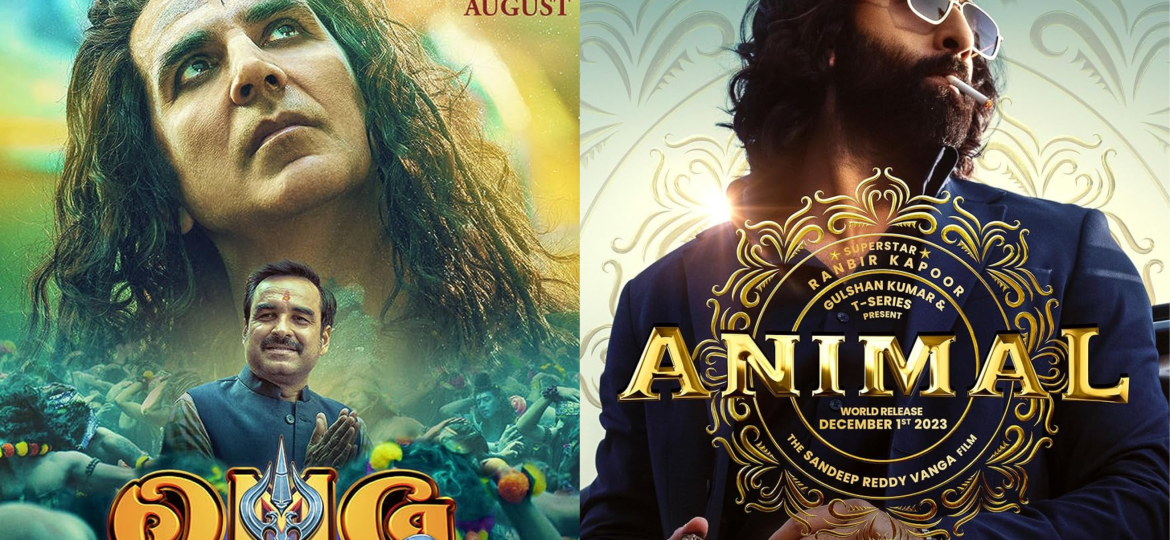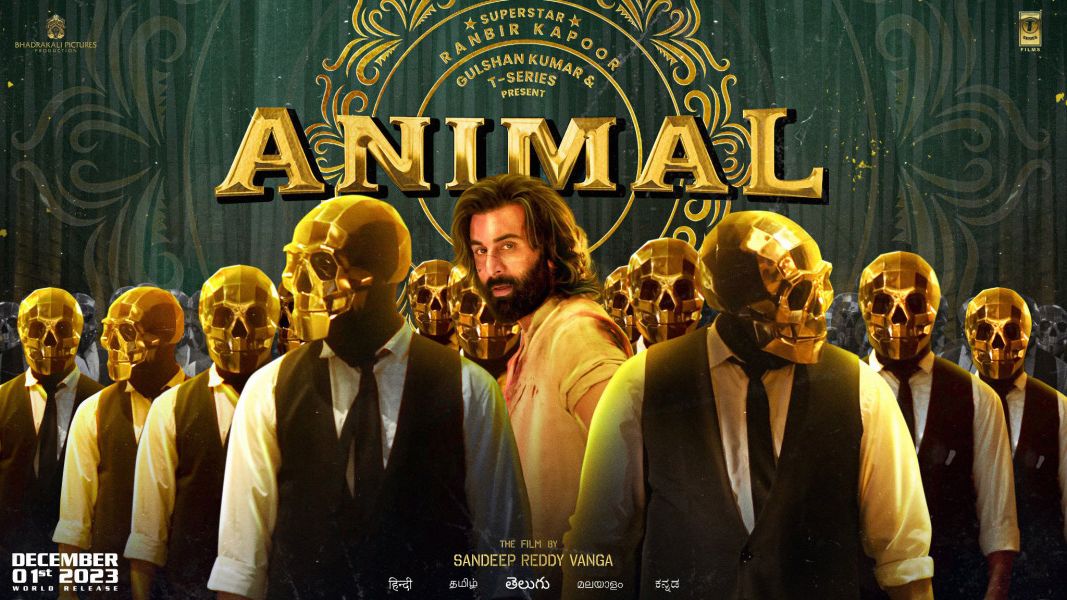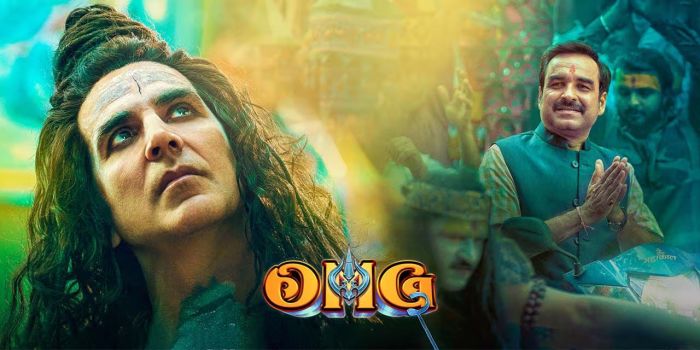
Almost everyone’s been talking about two recent Bollywood films, Animal and OMG 2. We decided to watch them ourselves to see what the hullaballoo is all about and found that both the movies bring up many of the issues that we work on. Here’s what we think about each of the films. (T1, T2, T3, and so on are short for TARSHI reviewer 1, 2, 3 etc.)
Animal (Sandeep Reddy Vanga, 2023)

T1: Animal was a very difficult watch for me from beginning to end. Supporters of the film repeatedly said that if the sexism and misogyny was abstracted from the film, the plot was actually good and it was well-made. I did not quite understand how aspects of violence and abuse can be simply divorced from a film whose trailer boasts of bloodshed as a means to achieve revenge, but I decided to give it a try nevertheless. A helpless boy denied his father’s love and attention all his life is transformed into a merciless, violent, and irrational creature – an animal. This very premise feeds into the conventional notions of masculinity and how they play out in the lives of boys and men. Throughout the film, the protagonist is shown to be an “ideal man” – protecting the women ‘in his care’, his sisters and his wife, from the perils of the outside world which they are obviously too silly to deal with themselves. As dictated by patriarchal norms, violence is the casual go-to means for achieving any end. The wife is expected to excuse the protagonist’s infidelity. After all, she ‘forgave’ the many murders he had committed before. It did not help that the dialogue was illogical.
The Islamophobia in the film is also overtly violent. Singling out one character as Muslim and then going on to exhibit their “traits” as matter-of-fact, when they are all just widespread (and hurtful) stereotypes in terms of the current socio-political and cultural temperament in India. The movie used this character’s being Muslim to “explain” why he behaved a certain way. It was clearly intended as an “aha!” moment for the audience and was honestly very painful to watch. There were also too many uncomfortable references to the phallus and the strength of masculinity throughout the movie. The two men fighting each other with their bare hands in the last scene while shirtless was another feather in the director’s cap, if the cap represented unnecessary references to prevailing ideas about gender. I personally think that all forms of Indian media, especially the film industry, have moved too far ahead in terms of quality and ethics of work for such crass and simplistic storylines to be justified as “it’s just a story” anymore. We can do better to address the casual and everyday sexism that are deplorable facts of life in our country.
***
T2: When Animal was released, a wave of controversy erupted around its misogyny and deeply problematic themes. From the beginning, it made me very uncomfortable with its skewed portrayal of relationships, lack of agency of the female characters, and the rampant glorification of violence where men were seen as ‘alpha male’ and protectors of the family. The protagonist, played by Ranbir Kapoor, reduces a woman’s entire existence to fulfilling her domestic responsibilities of raising children, and advocates for women choosing a macho man for familial protection. Other moments normalise violence, abuse, and infidelity in relationships, stating how women should be forgiving and submit. A particularly troubling scene depicts marital rape where a character played by Bobby Deol forcefully assaults his new wife publicly.
Overall, Animal was not a pleasant watch, and frankly, I found myself hurrying to reach the end, as it was pretty hard to sit through it. What is extremely concerning is the widespread appreciation for the film. Cinema plays an exceptionally influential role in shaping one’s perspective, and such films have the potential to bolster damaging gender stereotypes, reinforce toxic masculinity and normalise such behaviour as romantic and acceptable. Given the significant impact of media, it is important to deconstruct this sort of cinematic representation, especially for young people.
OMG 2 (Amit Rai, 2023)

T3: OMG 2 evoked mixed feelings in me. On the one hand, I felt happy to see a mainstream Bollywood movie explore the facets of sex education and its importance in the lives of young people. It aptly showed how there are myriad sources of misinformation when it comes to understanding one’s sexual health and wellbeing and why we need to begin conversations on building safe spaces for young people to access accurate, reliable and non-judgmental information on sexuality. While watching the arguments between Kanti (Pankaj Tripathi) and Kamini (Yami Gautam), I had a déjà-vu moment about how, at TARSHI, we hear and try to tackle (check our FAQs on Comprehensive Sexuality Education) so many of these questions “Is sexuality education a part of our Indian culture?”, “Wouldn’t imparting sexuality education to young people encourage ‘experimentation’?”, and “Who is responsible for talking about sexuality with young people? Is it the parents or the school?” The answers felt like a case being made for us engaging with schools as well as parents to help them understand why CSE is essential.
However, on the other hand, the film came with its own share of disappointments. Firstly, the many interlinkages made between religion and sexuality to provide legitimacy for imparting sexuality education was not a case well-made. It looked quite preachy and failed to acknowledge the limitations that religious beliefs and practices put on being able to explore one’s sexuality. Secondly, the film made it feel like sexuality education is important for young people to not engage in “wrong” activities, failing to affirm the rights of young people and their agency to make informed decisions for themselves based on correct information they can easily access. It also did not touch upon issues such as bullying, digital safety, and the mental wellbeing of adolescents and young people. Overall, the film was a 6/10 for me.
***
T4: I watched a lot of OMG 2 with an OMG face. Was I watching a Bollywood movie debating ‘sex education’ in schools? In a ‘mainstream’ film that too, with one of India’s most bankable stars? At some points, it looked like lines were exactly what any TARSHI trainer on CSE would say in a training for teachers: “Why do we teach kids the names for eyes, nose, and so on and then go straight to the knees, as if there’s nothing in between?” It did seem like the country and the entertainment industry have come a long way!
Yet… I was also puzzled. Why was there so much mansplaining throughout the film? Why was there no attempt to explain what ‘sex ed’ was, just a smattering of everything from names of body parts to safe and unsafe touch to sex to masturbation? Why was a female lawyer positioned as the ‘opposition’ to sexuality education? Why was it so focused on one religion, or so focused on the ‘glorious’ history of Indian culture when it comes to sexuality to make its point? Why was sex work still something that brought tears to the protagonist’s eyes: “Here is a mother who will do anything – anything – for her son to get a good education”.
Lastly, I was left wondering at many points. How were children being dragged into court in full view of an external audience? How could there be no reference to multiple attempts – by governments, other schools, NGOs (including us!) – to introduce nuanced, age- and stage- appropriate sexuality education? Why was there a religious figure in the picture at all?
All said and done, I would say that I’m still amazed that such a film got made, that such a conversation took place, irrespective of its missing nuance, poor sensitivity at some points, and overall preachiness. Too bad that children and young people below 18 – whose lives the film centres – were technically not allowed to watch it in theatres. I suppose that best describes the state of affairs with sexuality education in the country.
***
T5: Even though this is meant to be a review, I am not going into my thoughts about the film and the treatment of the subject, links with religion, gaps and stereotypes, etc. Instead, I’d like to highlight how the myths and misconceptions around masturbation and sexual desire that we used to address over the TARSHI helpline and in sessions with school students and teachers as far back as the late 1990s and early 2000s still abound. It’s deeply unfortunate that over twenty years later, with instant access to information through the internet, young people still have to go through confusion, fear, shame and guilt around their sexuality unnecessarily. Watching a film doesn’t necessarily change one’s attitudes, though it can start a conversation around topics not often discussed within several Indian families – in this case, topics related to sex, sexuality, and sexual and reproductive health. The film’s box office (even with an A rating) and OTT viewership figures show that tens of thousands have seen it, and I take heart from that. Entertainment with mainstream Bollywood actors has the potential to go where ordinary NGOs and sexuality educators cannot, and for that, I am glad for OMG 2; it is a great conversation starter where there has been silence for too long!